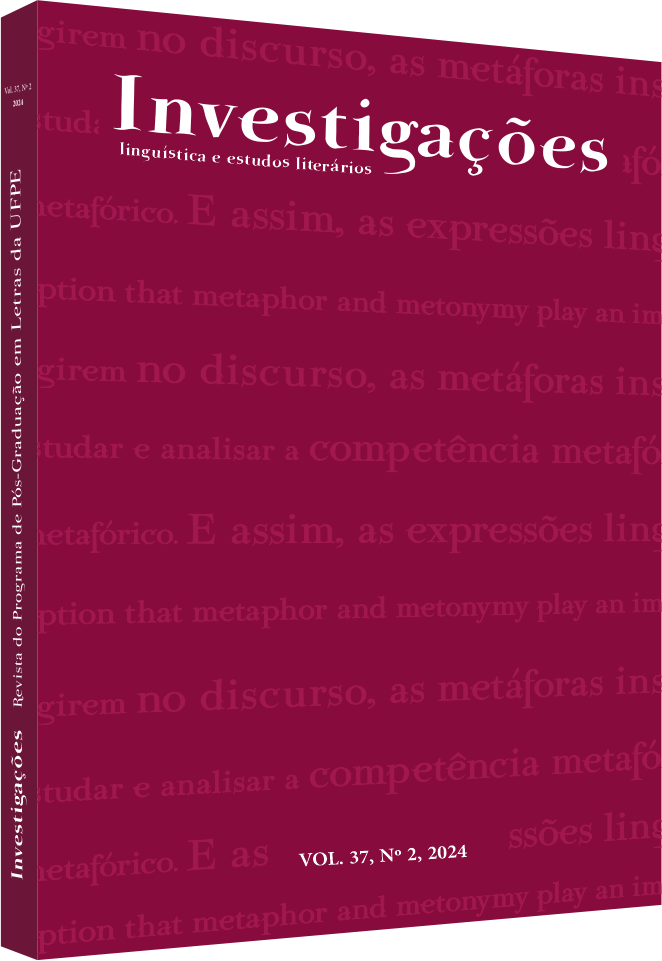Comparative subjective reading in a university context: report of an experiment
DOI:
https://doi.org/10.51359/2175-294x.2024.263724Keywords:
literature, subjectivity, reader's notebookAbstract
This work, linked to the teaching research project Literature and other languages – comparative readings and the teaching of literature, presents results of a research carried out by teachers of french language and literature subjects, based on a proposal for subjective and comparative reading. The proposal is supported by readings by Rouxel (2018), Langlade (2007), Lemarchand Thieurmel (2014), Bakhtin (1992,1997), among others. The results obtained through the evaluation of reading diaries demonstrate, among other aspects, that the use of this, during the reading process, contributes to the reader's awareness of the subjective literary aspect.
References
ABREU, M. Cultura letrada: literatura e leitura. São Paulo: Ed. UNESP, 2006.
ANDRIEU, M. (Réalisateur). Le dernier jour d'un condamné [court-métrage]. CRDP de Franche-Comté & Vie des Hauts Production, 2002. Disponible sur: https://www.youtube.com/watch?v=-IvIfYv7o5Q. Consulté le 15 juin 2020.
BAKHTIN, M. M. Estética da criação verbal. Tradução de Maria Ermantina Galvão Gomes Pereira. São Paulo: Martins Fontes, 1992.
BAKHTINE, M. M. Esthétique et théorie du roman. Paris : Les Éditions Gallimard, 1997.
BOURNEUF, R. et OUELLET, R. L’Univers du roman (4. éd.). Paris : PUF: Presses Universitaires de France, 1985.
CAMUS, A. L’Etranger. Paris : Les Éditions Gallimard,1942. Disponible sur: http://classiques.uqac.ca. Consulté le 16 juin 2020
CHARTIER, P. Introduction aux grandes théories du roman (1 éd.). Paris: Dunod, (1998).
CORSI, M. S. A narrativa literária francesa como suporte para o letramento do leitor-aprendiz de FLE. Maringá: Eduem, 2015.
GENETTE, G. Palimpsestes: la littérature au segond degré. Paris: Seuil.
HUGO, V. (1829). Le Dernier jour d’un condamné. La Bibliothèque électronique du Québec. Collection À tous les vents, volume 141 : version 1.0. p.68-214,1982. Disponible sur: https://beq.ebooksgratuits.com/vents/hugo-claude.pdf. Consulté le 18 juin 2020.
HUGO, V. Une comédie à propos d’une tragédie. La Bibliothèque électronique du Québec. Collection À tous les vents, volume 141 : version 1.0.p.49-67,1829. Disponible sur: https://beq.ebooksgratuits.com/vents/hugo-claude.pdf. Consulté le 18 juin 2020.
HUGO, V. Préface. Dans HUGO, V. Le Dernier jour d’un condamné (1829). La Bibliothèque électronique du Québec. Collection À tous les vents, volume 141 : version 1.0.p.06-48,1832. Disponible sur: https://beq.ebooksgratuits.com/vents/hugo-claude.pdf. Consulté le 18 juin 2020.
HUGO, V. Claude Gueux. La Bibliothèque électronique du Québec. Collection À tous les vents, volume 141 : version 1.0. p.215-265, 1834. Disponible sur: https://beq.ebooksgratuits.com/vents/hugo-claude.pdf. Consulté le 21 juin 2020.
HUGO, V. Le Dernier jour d’un condamné (audio). Disponible sur: http://www.litteratureaudio.com/livre-audio-gratuit-mp3/hugo-victor-le-dernier-jour-dun-condamne.html. Consulté le 18 juin 2020.
HUGO, V. Les Misérables. Tome I – FANTINE. Texte annoté par Guy Rosa, professeur à l’Université Paris-Diderot. Edition du groupe Ebooks libres et gratuits,1862. Disponible sur: http://www.groupugo.univ-parisdiderot.fr/Miserables/Default.htm. Consulté le 25 juin 2020.
HWANG, Á. D. Dicionário monolíngue de língua estrangeira: visitas guiadas como instrumentalização para uma autonomia no aprendizado da língua. Entrepalavras, Fortaleza, v. 11, n. esp., p. 196-212, ago. 2021. DOI: 10.22168/2237-6321-10esp2070.
LANGLADE, G. La lecture subjective. Québec français, Printemps, (145), 71–73, 2007. Disponible sur: https://id.erudit.org/iderudit/47315ac. Consulté le 5 juin 2023 16:09.
LECOQ, C. (2015). Le carnet du lecteur: un outil pour la formation du sujet-lecteur. Education. ffdumas-01252745f. Disponible sur: https://dumas.ccsd.cnrs.fr/dumas-01252745. Consulté le 18 juin 2021.
LEMARCHAND THIEURMEL, S. Lecture subjective en classe et avènement du sujet lecteur: Étude longitudinale en lycée professionnel. Thèse de L’Université de Rennes 2. Mention Langue et Littérature Françaises École doctorale ALL. Thèse soutenue le 17 octobre 2014.
ROUXEL, Annie. Oser lire à partir de soi. Enjeux épistemologiques, éthiques et didactiques de la lecture subjective. Revista Brasileira de Literatura Comparada, v.20, n. 35. 10-25, 2018a. Disponible sur:
https://revista.abralic.org.br/index.php/revista/article/view/497/540. Consulté le 18 juin 2020.
ROUXEL, Annie. Lecture subjective : implication émotionnelle et cognitive du sujet lecteur. Eutomia, Recife, 22(1): 235-252, 2018b.
DOI: https://doi.org/10.19134/eutomia-v1i22p235-252. Disponible sur: https://periodicos.ufpe.br/revistas/EUTOMIA/article/view/239982. Consulté le 25 juin 2020.
SPIQUEL, A. Victor Hugo: Le Dernier Jour d'un condamné [vidéoconférence]. Chaîne youtube, Université de Nantes, 2017. Disponible sur: https://www.youtube.com/watch?v=cj9vcHrXJLI. Consulté le 15 juillet 2020.
SZAC, M. Préface. Dans HUGO, V. Le Dernier jour d’un condamné. (pp. 07-14). Paris: POCKET, 2015.
VIANA, K. Os Miseráveis em cordel. Ilustrações de Murilo e Cintia. São Paulo: Nova Alexandria, 2008.
VIANA, K.. Os Miseráveis em cordel. Xilogravura de Maércio Siqueira. Fortaleza: Tupynanquim, 2020.
Downloads
Published
How to Cite
Issue
Section
License
Copyright (c) 2024 Margarida da Silveira Corsi, Álvaro David Hwang

This work is licensed under a Creative Commons Attribution 4.0 International License.
Authors who publish with Revista Investigações agree to the following terms:
Authors retain copyright and grant the journal right of first publication with the work simultaneously licensed under the Creative Commons Attribution 4.0 International (CC BY 4.0) license that allows others to share the work with an acknowledgement of the work's authorship and initial publication in this journal.
Authors are able to enter into separate, additional contractual arrangements for the non-exclusive distribution of the journal's published version of the work (e.g., post it to an institutional repository or publish it in a book), with an acknowledgement of its initial publication in this journal.
You are free to:
Share — copy and redistribute the material in any medium or format for any purpose, even commercially.
Adapt — remix, transform, and build upon the material for any purpose, even commercially.
The licensor cannot revoke these freedoms as long as you follow the license terms.
Under the following terms:
Attribution — You must give appropriate credit , provide a link to the license, and indicate if changes were made . You may do so in any reasonable manner, but not in any way that suggests the licensor endorses you or your use.
No additional restrictions — You may not apply legal terms or technological measures that legally restrict others from doing anything the license permits.

